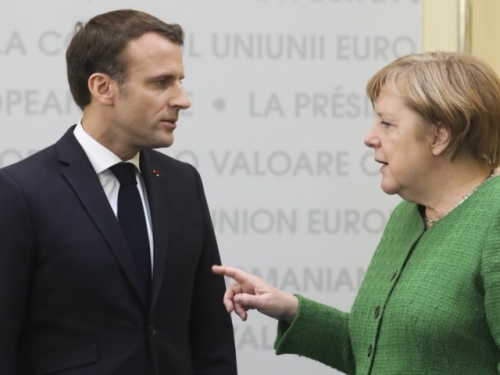De ce point de vue, les années qui ont suivi la réunification ont offert de quoi alimenter la chronique, et ce qui a été perçu de la RDA rétrospectivement nourrit sans doute durablement l’imaginaire de nos étudiants. L’économie n’y tient pas la place principale, mais les esprits sont marqués par ce qui a fait longtemps la une des médias : la découverte du monde de la Stasi et du mouchardage généralisé, l’explosion des actes xénophobes après 1989, la présence visible de l’extrême-droite, qui ravivent les vieilles craintes et confirment les suspicions.
Il peut être utile de partir de cette observation contemporaine pour démêler la part de l’ancien et du nouveau dans ce phénomène inquiétant. L’extrême-droite dans les nouveaux Länder a-t-elle quelque chose à voir avec le rapport de la RDA au nazisme, ou est elle entièrement née de l’après-réunification ? Peut-on apprécier, et avec quels moyens, la réception en RDA de l’antifascisme officiel ?
L’antifascisme sert à légitimer la RDA
4Dans l’historiographie de la RDA, la période 1945-1949 est désignée comme celle des transformations « antifascistes démocratiques », de l’ordre « antifasciste démocratique ». Elle se définit par le caractère antifasciste de la politique qui y est menée sous le contrôle de l’occupant soviétique. La fondation de l’État est-allemand est présentée comme inscrite dans la continuité de cette période de transition : la RDA est fille de l’antifascisme. L’occupant soviétique n’apparaît pas comme l’acteur principal de ce « bouleversement », ce qui serait contre-productif dans une perspective d’autolégitimation. Dans l’historiographie de RDA, les acteurs sont des antifascistes de divers horizons, dont l’expression politique commune est le « front Unique » des partis antifascistes et démocratiques (Einheitsfront der antifaschistisch-demokratischen Parteien) et qui collaborent au renouveau de l’Allemagne au sein d’un dispositif dont le SED est la pièce maîtresse (Münkler, 1998 : 16sq.).
»Auf freiem Grund mit freiem Volke stehen« (Goethe, Faust II, v. 11581).
5On voit donc émerger un sujet qui est institué porteur d’identité au moment de la fondation de la RDA : l’Allemagne antifasciste. Dans le passé immédiat, c’est l’Allemagne des opposants au nazisme, celle des émigrants, des résistants et spécialement des résistants communistes. Mais on assigne aussi à cette Allemagne antifasciste une profondeur historique : ce sont les « traditions humanistes et progressistes » de l’histoire allemande, incarnées par Thomas Münzer et la guerre des paysans, par les guerres de libération de 1813-1814, par les Lumières, par Lessing, mais aussi par Heine, Thomas Mann et, puisqu’il est incontournable, par Goethe. Ulbricht a pu dire en 1962 que la RDA, c’était le 3e Faust (»dritter Teil des „Faust“«). Ce qui voulait dire que la RDA incarne le meilleur des idéaux humanistes, en particulier la vision de Faust au moment de sa mort, dans le second Faust, lorsqu’il prédit et appelle de ses vœux l’avènement d’un état de liberté où l’homme industrieux est libéré des contraintes injustes : « Me tenir sur une terre libre parmi un peuple libre » (traduction H. Lichtenberger)1.
6C’est une référence fondatrice, et on la voit à l’œuvre par exemple dans la querelle au sujet de l’opéra de Hanns Eisler Johann Faustus. Le livret publié en 1952 réinterprétait le personnage de Faust et en faisait un exemple de la faillite de l’intellectuel allemand, qui se range au côté des princes dans la guerre des paysans, un renégat qui trahit la paysannerie dont il était originaire, et qui scelle sa trahison par un pacte avec le diable dans lequel il renonce à tous ses idéaux humanistes. Faust n’annonçait plus la RDA, il annonçait le fascisme. Il n’était pas question pour les responsables de RDA de laisser subvertir l’image de Faust dont elle se réclamait, celle du chercheur de vérité, de renoncer à un élément aussi central de l’héritage culturel classique. Faust devait rester intangible pour que la RDA puisse continuer à revendiquer l’héritage culturel face à une République fédérale ou régnait selon les termes officiels la non-culture, la barbarie culturelle, l’américanisme. La polémique déclenchée par voie de presse s’est achevée par un dernier débat le 10 juin 1953, une semaine avant le soulèvement du 17 juin. L’opéra n’a jamais vu le jour, Eisler a renoncé à composer la musique.
L’antifascisme est souvent désigné comme le « mythe fondateur » de la RDA : mythe fondateur en tant que récit des origines et en tant que récit qui donne une vision simplifiée de ces origines, suffisamment simple pour diffuser largement et servir de repère à une collectivité pour s’orienter dans l’histoire. Les mythes fondateurs ne s’embarrassent pas d’exactitude historique, leur utilité n’est pas du domaine de la connaissance, mais elle résulte de leur capacité à créer un consensus, à uniformiser la vision qu’une communauté a de sa propre histoire, en écartant les visions divergentes et non consensuelles.
Le récit des origines véhicule un message simple : l’antifascisme est consubstantiel à la RDA. La RDA a extirpé chez elle les racines du fascisme, du passé elle a fait table rase, elle ne porte pas en elle le péché originel du nazisme. Cette Immaculée Conception la délivre du poids du passé : bien qu’allemande, elle n’a rien à voir avec la guerre et avec le fascisme allemand. Dans les années 1950, elle est souvent représentée sur les affiches de propagande comme un nouveau-né, symbole d’innocence. En 1969 encore, pour le 20e anniversaire de la RDA, la campagne d’agitation qui accompagne les festivités utilise des photos de bébés nés le 7 octobre pour illustrer ce caractère de page blanche attribué à la naissance de la RDA (Gibas et al., 1999 : 32 ; Gries/Satjukow, 2003 : 24).
L’après-guerre a été une période riche en mythes fondateurs ou refondateurs. En ce sens, l’Autriche a aussi son mythe re-fondateur qui n’est pas l’antifascisme, mais l’extra-fascisme : l’Autriche première victime du nazisme, victime d’un nazisme exogène, dont elle n’a donc pas à rendre compte. Le confort de ce mythe re-fondateur a été dénoncé inlassablement par toute une série d’écrivains autrichiens, de l’humoriste Helmut Qualtinger à l’imprécateur Thomas Bernhard. Il y a eu aussi un mythe de la France résistante, qui a longtemps prévalu dans la conscience collective, à tel point que c’est de l’extérieur qu’est venue la remise en cause de cette représentation confortable, avec les travaux de l’américain Robert Paxton sur la France de Vichy.
La thèse de l’antifascisme collectif conduit, en RDA comme dans d’autres pays, à une forme d’absolution collective. Le Komintern avait donné dans les années 1930 une définition universalisante du fascisme : la dictature de la fraction la plus réactionnaire et la plus agressive du capitalisme monopoliste (Böhme, 1983 : 257). Cette définition a été reprise telle quelle par la RDA. Son caractère universel avait l’avantage de ne pas isoler le nazisme des autres formes de fascisme, de l’inscrire dans un contexte européen. Mais de par son interprétation marxiste strictement orthodoxe, il laissait hors champ les caractères spécifiques de l’histoire allemande, le déficit démocratique, la tradition autoritaire. Les coupables, c’étaient un groupe de « capitalistes monopolistes ». À la lumière de cette thèse, la question de la responsabilité morale, individuelle ou collective de la population allemande était une question secondaire. Ce qui comptait, c’était que les vrais coupables aient été éliminés par l’épuration des années 1945-47, ou qu’ils se soient éliminés eux-mêmes en fuyant à l’Ouest devant l’avance de l’Armée rouge. Les bases matérielles de leur pouvoir avaient été supprimées par la réforme agraire et par les expropriations industrielles en 1946. Le reste de la population était absous par la définition elle-même, et pouvait considérer en toute bonne conscience que les assassins n’étaient plus dans ses rangs. Quand l’« ordre antifasciste » est devenu l’État antifasciste, les habitants de cet État ont été implicitement invités à se considérer de facto comme antifascistes, la question de leur co-responsabilité à l’époque du nazisme a perdu sa pertinence.
Il y a eu quelques cas, comme Ernst Grossmann, membre du comité central du SED, qui avait été le p (...)
11Ils étaient confortés dans cette attitude par la pratique soviétique de la dénazification, différente de la pratique américaine. L’occupant soviétique a concentré ses efforts sur les principaux responsables – avec les dérives que l’on sait dans l’usage politique de l’internement – mais ne s’est pas enlisé comme à l’Ouest dans l’épluchage de millions de dossiers. En 1948, le parti national démocratique, le NDPD, a été créé (3 ans après les autres partis) pour élargir la base politique sur laquelle s’appuyait le SED et permettre aux anciens membres du NSDAP de réintégrer la vie politique. Cette situation n’a pas empêché que d’anciens membres du parti nazi fassent partie du SED. Mais à la différence de la RFA, la RDA n’avait pas d’anciens nazis notoires aux postes de responsabilité2. Par ailleurs, la résistance communiste sous le nazisme, et par-delà, la résistance ouvrière, ont été hypostasiées. La classe ouvrière dans son ensemble était réputée avoir été imperméable au nazisme. Quiconque appartenait à la classe ouvrière au sens où l’entendait la RDA, avait en poche un certificat d’innocence. Pour les autres, le ralliement au programme du SED sous l’égide du « front unique » valait absolution.
12Cette perspective a trouvé son expression dans la notion de « vainqueurs de l’Histoire ». Au côté de l’Union soviétique qui avait payé un prix colossal pour gagner la guerre, on était dans le camp des « vainqueurs de l’Histoire ». La formule, introduite par la propagande de RDA, a connu un franc succès : c’était une façon commode de se démarquer des coupables et de renvoyer l’héritage de la culpabilité dans l’autre camp, dans l’autre Allemagne. L’historien Bernd Faulenbach, dans un rapport pour la commission d’enquête du Bundestag, a parlé de ce phénomène en disant : « L’héritage national-socialiste est devenu le problème des Allemands de l’Ouest, Hitler était devenu pour ainsi dire un Allemand de l’Ouest » (cité par Münkler, 1998 : 23).
L’antifascisme sert à saper la légitimité de la RFA
13La RDA a fait un usage polémique du mot « fascisme » et de l’antifascisme. Dans un premier temps, l’objectif a été de combattre l’idée d’une légitimité du régime nazi, car celui-ci n’avait pas que des adversaires dans la population. En témoignent les enquêtes faites jusqu’au début des années 1950 par les Américains, selon lesquelles une proportion importante des personnes interrogées pensaient encore que le nazisme était une bonne idée, mais mal appliquée.
Dans un deuxième temps, après la fondation des deux États allemands, il s’est agi de nier la légitimité de l’État d’en face en l’assimilant à ce qui est illégitime par excellence : le fascisme. Dans la logique de ce discours, la RFA était préfasciste, potentiellement fasciste, ou réellement fasciste. Jusqu’à la fin des années 1960, Bonn est dans le discours de la RDA un repère de nazis, de fascistes, de criminels de guerre et de revanchards alliés aux impérialistes américains et à leur complexe militaro-industriel. Berlin-Ouest mérite une mention spéciale comme poste avancé de la lutte des revanchards contre la RDA.
À l’appui de cette thèse, la RDA, en 1963, ouvre une instruction contre Hans Globke, Secrétaire d’État à la Chancellerie, qui avait été le commentateur officiel des lois de Nuremberg sous le IIIe Reich. Dans la même veine, elle fait diffuser en 1965 le « Livre gris » (Graubuch), une documentation qui énumère 1 800 grands nazis ou criminels de guerre qui occupent des fonctions importantes en République fédérale, en particulier dans la justice et dans l’armée, ou qui touchent des pensions confortables. La République fédérale y est présentée comme le paradis des criminels de guerre. Le titre même de l’ouvrage renvoie à un classique de la lutte antifasciste, le « Livre brun » (Braunbuch) édité par les émigrés allemands en juillet 1933 pour dénoncer la manipulation de l’incendie du Reichstag par les nazis. La République fédérale prêtait le flanc à ce genre de critique étant donné l’ampleur des amnisties et des lois de réintégration dans les années 1950. La République fédérale est présentée comme l’héritière de l’Allemagne fasciste, la RDA comme l’héritière de l’Allemagne antifasciste. Elle revendique sur cette base une légitimité morale qu’elle oppose à la prétention constante de la République fédérale à être seule représentante légitime de tous les Allemands (Alleinvertretungsanspruch).
Corollairement, tout ce qui menace l’existence de la RDA est qualifié de fasciste : après une brève période de flottement, le soulèvement du 17 juin 1953 est devenu dans la doctrine officielle la tentative de « putsch fasciste » du 17 juin, et va le rester quasiment jusqu’à la fin. On va se donner beaucoup de mal pour apporter des éléments de preuve à l’appui de la thèse, et pour montrer qu’il y avait d’anciens nazis à la tête des manifestations. La propagande a beaucoup exploité le cas d’une femme nommée Erna Dorn condamnée à mort et exécutée parce qu’elle était supposée avoir été surveillante au camp de concentration de Ravensbrück et avoir suscité un comité de grève en juin 1953 à Halle. À tel point que Stefan Hermlin a repris le sujet et son interprétation officielle dans une nouvelle, »Die Kommandeuse« (1954). En fait, tout indique aujourd’hui, depuis l’ouverture des archives, qu’Erna Dorn a simplement été délivrée de prison par les émeutiers du 17 juin, mais qu’elle n’a pris aucune part active au soulèvement. Il n’est même pas certain qu’elle ait été surveillante à Ravensbrück.
Quant au mur de Berlin, on a souvent rappelé que la RDA, contre toute évidence, le désignait comme un « rempart antifasciste », et célébrait tous les ans l’anniversaire de la construction de ce rempart.
La narration rituelle/la narration du mythe
18Il n’y avait eu en Allemagne moyenne comme dans le reste du Reich qu’une faible minorité de résistants au nazisme. La population de la zone soviétique comptait 1,5 million d’anciens membres du NSDAP. L’adhésion à la thèse de l’antifascisme collectif pouvait donc rarement reposer sur une expérience individuelle ou familiale. D’où l’importance particulière des moyens de propagation institutionnels pour ancrer et entretenir cette représentation :
La narration scolaire, dont il sera question par ailleurs, forge pour des générations d’élèves une épopée fondatrice de la RDA faite de l’histoire des antifascistes assassinés, au premier rang desquels se trouve Ernst Thälmann.
La liturgie des manifestations officielles et des cortèges commémoratifs produit une narration rituelle : 17 janvier, date anniversaire de l’assassinat de Karl Liebknecht et de Rosa Luxembourg ; 1er mai, fête du travail ; 8 mai, anniversaire de la Libération (Tag der Befreiung) ; 7 octobre, fête nationale. Dans les manifestations et les cortèges officiels, l’antifascisme avait sa place dans les slogans affichés sur les pancartes et les banderoles.
19Le 8 mai mérite une mention particulière. On fêtait ce jour-là la victoire des « forces progressistes de l’Histoire » sur la barbarie hitlérienne, en soulignant le rôle de libérateur joué par l’Union soviétique (Gibas, 2003 : 145). Cela a laissé des traces :
« Une enquête comparative sur les conceptions de l’histoire des Allemands de l’Est et de l’Ouest (réalisée dix ans après l’unification) a montré que les Allemands de l’Est considèrent aujourd’hui encore la participation de l’Union soviétique à l’effondrement du nazisme comme déterminante, alors que pour les Allemands de l’Ouest, c’est celle des alliés occidentaux qui a été déterminante. » (ibid. : 153).
»Bericht des Delegierten der Deutschen Demokratischen Republik.«
Les anniversaires aux chiffres ronds (le dixième, vingtième, trentième anniversaire de la RDA) ont été analysés dans le cadre d’un projet de la Deutsche Forschungsgemeinschaft sur la propagande de RDA. Ces grands anniversaires, précédés de campagnes de mobilisation importantes, étaient l’occasion de réactiver à grande échelle le récit des origines. À côté des perspectives d’avenir (« En avant vers de nouveaux succès ! »), il y avait le regard sur les origines. Pour le 40e anniversaire en 1989, il y avait toujours une affiche qui disait : « Plus jamais le fascisme et la guerre ! 40 ans de politique d’État » (Gibas et al., 1999 : 257). Pour le 20e anniversaire en 1969, la RDA a diffusé une anthologie de poèmes intitulée « Miroir de notre devenir. L’homme et le travail dans la poésie allemande de Goethe à Brecht ». L’anthologie contenait un poème signé Helmut Preißler, écrit plusieurs années après la mort de Brecht et intitulé « Rapport du délégué de la RDA »3. Le poème raconte l’histoire de la RDA à travers celle d’une famille : le père, fait prisonnier sur le front russe, est revenu de captivité métamorphosé en antifasciste militant. Et le fils dit de lui-même :
»Ich selbst habe von vornherein / Hass gelernt gegen den Faschismus / Liebe zu allen Nationen und (...)
« Moi-même j’ai appris dès le départ
à haïr le fascisme
à aimer toutes les nations et toutes les races,
et à aimer notre État des ouvriers ».4 (ibid. : 256)
21Un certain nombre de lieux de commémoration contribuaient à asseoir l’idée d’une identification entre l’État de RDA et l’antifascisme. La Neue Wache sur l’avenue centrale Unter den Linden à Berlin-Est était un mémorial dédié aux « victimes du fascisme et du militarisme ». La relève de la garde y était particulièrement soignée, pour montrer le prix que le pays y attachait. La grande relève de la garde (Großer Wachaufzug), une fois par semaine, était suffisamment spectaculaire pour attirer les groupes de touristes et les soldats américains de Berlin-Ouest.
Le mémorial de Buchenwald a joué un rôle éminent dans la politique de la mémoire en RDA. Dans l’enceinte du camp, la RDA a construit un complexe monumental, des escaliers monumentaux convergeant vers un monument à la mémoire des victimes du camp et du soulèvement des détenus. Le pèlerinage à Buchenwald était un passage obligé pour tout enfant scolarisé en RDA, et pour les groupes de la FDJ, l’organisation de jeunesse. C’est là que se manifestait de la manière la plus visible l’antifascisme d’État, où chacun était invité à se pénétrer de l’idée que l’antifascisme était consubstantiel à la RDA.
Les icônes nationales, particulièrement Ernst Thälmann, incarnent l’antifascisme. Secrétaire Général du Parti Communiste Allemand (KPD) avant 1933, candidat communiste à l’élection présidentielle sous la république de Weimar, Ernst Thälmann a passé dix ans en camp de concentration avant d’être finalement assassiné au camp de Buchenwald. Ces années ont fait de lui le principal martyr de la résistance communiste.
Dans le moindre village, après 1950, il y a eu une rue Thälmann, une place Thälmann et dans toutes les villes des usines Thälmann, des écoles Thälmann et des parcs Thälmann. L’omniprésence du nom témoigne d’une volonté politique de populariser son image. Après l’alignement du SED sur le Parti Communiste soviétique et l’introduction du centralisme démocratique, Thälmann est devenu la grande figure symbolique de la RDA, parée de toutes les vertus : sagesse, prévoyance, vision d’ensemble, autorité naturelle, les qualités d’un vrai chef. Il était en particulier donné en exemple aux enfants dès le plus jeune âge, les pionniers s’appelaient les pionniers Thälmann, et on y prêtait serment à Thälmann : « Ernst Thälmann est mon modèle, je prête serment d’apprendre, de travailler et de lutter selon l’exemple d’Ernst Thälmann. Je respecterai les lois des pionniers Thälmann. Conformément à notre salut, je serai toujours prêt pour la paix et le socialisme ».
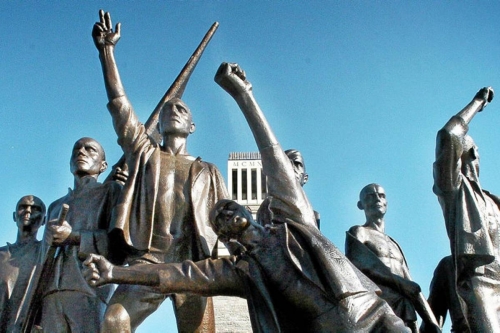
Enfin, le génocide juif n’a pas eu la même place dans la mémoire de la RDA que dans celle de la République fédérale : l’absolution collective liée au mythe fondateur a renvoyé le travail de mémoire sur le génocide juif à « ceux d’en face », aux héritiers supposés du national-socialisme, aux Allemands de l’Ouest. Dans le mémorial de Buchenwald, l’exposition permanente sur le système des camps de concentration mettait en relief la persécution des communistes et le traitement des prisonniers soviétiques, beaucoup plus que l’extermination des Juifs et des Roms. Les commémorations du 9 novembre sont également significatives à cet égard. Le 9 novembre est une date très chargée de l’histoire allemande : celle de la révolution de novembre 1918, du putsch avorté de Hitler en 1923, de la « nuit de cristal » en 1938, et depuis 1989 c’est aussi la date de l’ouverture du mur de Berlin. Pendant longtemps, le pogrom nazi de 1938 a été éclipsé par la commémoration de la révolution de 1918. Le 9 novembre était consacré à la commémoration de la révolution de novembre (Gedenktag der Novemberrevolution), et la « nuit de cristal » était reléguée à une place marginale. Les choses ont commencé à changer en 1978, avec le 40e anniversaire de la nuit de cristal. Le nouveau cadre international (les accords d’Helsinki, la nouvelle respectabilité internationale de la RDA, la recherche d’un rôle actif au niveau international) ne permettait plus de faire l’impasse sur la question au moment où la série télévisée Holocauste sensibilisait à nouveau l’opinion occidentale à la question du génocide. Contrairement aux deux décennies précédentes, le sujet a commencé à être traité dans les médias. Dans les années 1980, les considérations de politique internationale ont joué aussi un rôle décisif : après sa visite officielle à Bonn (plusieurs fois reportée), E. Honecker souhaitait consacrer la reconnaissance internationale de la RDA par une visite officielle à Washington. Ces considérations ne sont pas étrangères au programme commémoratif mis en œuvre pour le 9 novembre 1988, 50e anniversaire de la nuit de cristal. L’aspect le plus spectaculaire en a été la rénovation (longtemps différée) de la grande Synagogue de Berlin, située dans la partie est de la ville et détruite en 1938, et l’invitation de personnalités juives internationales.
Succès du mythe fondateur antifasciste
L’antifascisme officiel de RDA est souvent qualifié d’antifascisme de commande (»verordneter Antifaschismus«). Même si la démarche politique est indéniable, cette démarche a cependant suscité une adhésion dont ne rendent pas suffisamment compte tous les discours polémiques sur la question. Dans son rapport d’expertise devant la commission d’enquête du Bundestag, l’historien Bernd Faulenbach souligne que l’antifascisme a été un ciment idéologique bien plus fort que l’idéologie marxiste. De même que l’anticommunisme a été l’un des ciments idéologiques de la société d’après guerre à l’Ouest, l’antifascisme a contribué à la consolidation interne de la RDA en désignant un ennemi commun. Il avait une grande force émotionnelle, et il a conservé sa crédibilité bien après que l’idéologie marxiste s’est figée en un corpus doctrinaire perçu comme déconnecté de la réalité. L’antifascisme n’était pas un simple slogan (Drechsler et al., 1997, vol. 1 : 150-152).
En 1972, Wolf Biermann, interdit de publication depuis 8 ans, publiait à l’Ouest son recueil Deutschland, ein Wintermärchen (Allemagne, conte d’hiver), où il éreinte la RDA qui est pour lui le pays de la révolution trahie, des espoirs trahis, de la trahison au pouvoir (Biermann, 1972, 66-68). Mais la critique atteint ses limites lorsque les deux Allemagne sont comparées du point de vue de l’antifascisme :
»Die DDR, mein Vaterland / Ist sauber immerhin / Die Wiederkehr der Nazizeit / Ist absolut nicht d (...)
est propre en tous cas
le retour du nazisme
y est absolument impossible.
Nous avons tellement bien frotté
avec le dur balai de Staline
que le derrière autrefois brun
est devenu tout rouge.5
La force d’intégration réelle de cet antifascisme d’État a permis à la première génération de l’après-guerre d’éviter à bon compte de se poser la question de la culpabilité, et a contribué à maintenir dans la deuxième et la troisième génération un degré de respectabilité élevé du motif antifasciste.
On trouve la trace ambiguë de cette force d’imprégnation du motif antifasciste dans les œuvres de la nouvelle génération d’écrivains est-allemands qui avaient environ quinze ans à la chute du mur et qui publient leurs premières œuvres plus de dix ans après la disparition de leur pays d’origine : leur socialisation s’est faite en RDA, et leur entrée dans le monde adulte s’est faite dans l’Allemagne unifiée.
Le plus médiatisé de leurs livres est sans doute celui de Jana Hensel, Zonenkinder (Enfants de la « Zone »). On peut citer bien d’autres exemples de cette littérature de la génération « à cheval » sur deux mondes qui est l’objet d’un certain engouement : Claudia Rusch, Meine freie deutsche Jugend, André Kubiczek, Junge Talente, Falko Hennig, Trabanten, Annette Gröschner, Moskauer Eis, Jana Simon, Denn wir sind anders, etc. Ces auteurs qui avaient entre treize et vingt ans à la chute du Mur témoignent clairement de la différence entre la rupture biographique qu’ils ont vécue et celle qu’ont vécue leurs aînés. Pour la génération de leurs parents, la fin de la RDA a signifié la perte des idéaux (quand bien même l’idéal était celui d’une « autre » RDA), la mise en cause publique, la dévalorisation de l’expérience de toute une vie, le retour introspectif sur la question de la co-culpabilité tel qu’on le retrouve dans de nombreuses autobiographies. Cette génération a eu le sentiment d’être sacrifiée par la réunification. En revanche, la génération de ces écrivains qui ont aujourd’hui entre trente et trente cinq ans, est dans un tout autre état d’esprit. Pour elle, l’unification a été vécue essentiellement comme une ouverture inespérée, et le mixage Est-Ouest s’est opéré rapidement. Mais étant de plain-pied dans l’Allemagne unifiée, ils revendiquent le droit de se reconnaître sans fausse mauvaise conscience dans l’environnement de leur enfance, sans avoir à en abjurer une part.
Leurs récits, leurs histoires sont centrés sur le monde de leur enfance et de leur adolescence, un monde parcouru de phantasmes comme tout univers d’enfance, et marqué par des rejets qui sont le propre de toute adolescence.
Claudia Rusch est issue d’une famille d’opposants très liée à Robert Havemann. Elle s’est identifiée très tôt aux positions de ses parents et se trouve en décalage par rapport à la plupart de ses camarades de classe. Mais il y au moins une chose qu’elle partage avec ceux-ci, c’est l’image de Thälmann. « Il faut savoir une chose », écrit-elle, « pour les enfants de RDA, Thälmann c’était Robin des bois et Superman en une seule personne » (Rusch, 2003 : 38) : une icône intangible, le socle de l’éducation antifasciste depuis le plus jeune âge, en particulier dans les petits journaux pour les pionniers qui popularisaient l’histoire édifiante de « Teddy » Thälmann.
Jana Hensel résume en quelques phrases l’impression qui se dégage de toute son éducation :
»Im Geschichtsunterricht unserer Kindheit waren wir Antifaschisten. Unsere Großeltern, unsere Elte (...)
« Dans les cours d’histoire de notre enfance, nous étions antifascistes. Nos grands-parents, nos parents, nos voisins – tout le monde était antifasciste […]. Quand je m’imaginais la Seconde Guerre mondiale, je nous voyais tous plus ou moins membres de la Rose Blanche ou en train de conspirer dans des caves ou des arrière-cours pour organiser la résistance et imprimer des tracts. La guerre n’avait pas eu lieu chez nous. Le monde qui m’entourait avait commencé en 1945 »6 (Hensel, 2002 : 108).
»Dann fiel mir auf, dass wir nie über solche Dinge gesprochen hatten. Wir wussten nicht, was unser (...)
35D’où une expérience étonnante qu’elle a faite après la chute du Mur : la scène se passe dans la région de Cologne, avec des amis de l’Ouest. Après une soirée bien arrosée, les amis ouest-allemands se mettent à confier les uns après les autres qu’ils ont dans leur famille un grand-père ou un grand-oncle très compromis dans le nazisme. Pour tous les amis de l’Ouest, cela fait partie de l’histoire familiale normale. Et elle s’aperçoit que elle, venant de l’Est, elle est la seule à n’avoir rien de tel à raconter : « Je me rendais compte que nous n’avions jamais parlé de ça. Nous ne savions pas ce qu’avaient fait nos grands-parents, s’ils avaient collaboré ou fait de la résistance […] On nous avait épargné les questions et les histoires pas très jolies à raconter »7 (112).

Conséquences à long terme
L’antifascisme de RDA a été un antifascisme d’État, et il est difficile de le dissocier de l’entreprise d’instrumentalisation de l’histoire menée dans les ex-pays de l’Est et en particulier en RDA. Le discrédit total jeté sur le régime de RDA après l’unification entraîne une remise en cause de cet antifascisme qui était accepté sans trop de difficulté jusqu’en 1989. Un antifascisme reposant sur l’idée que la RDA fait partie des « vainqueurs de l’Histoire » ne peut plus fonctionner après l’effondrement des régimes socialistes et l’expérience d’une unification où la population de l’Est n’a pas eu globalement le sentiment d’avoir vécu une victoire. L’antifascisme de RDA ne peut plus servir de référence auprès de la jeune génération.
Cet antifascisme d’État présente des zones d’ombre qui concernent les camps d’internement soviétiques et les procès de Waldheim. Dans les quatre zones, les occupants ont internés des suspects en quantité importante dans le cadre de la dénazification. Il y a eu onze camps d’internement en zone soviétique, dont deux installés dans des anciens camps de concentration, Buchenwald et Sachsenhausen. Les internements en zone soviétique présentent deux particularités par rapport à ceux des autres zones : d’une part, les soviétiques n’ont pas interné que des nazis et des criminels de guerre, mais ils se sont servis de l’étiquette « fasciste » pour interner des adversaires politiques, notamment des sociaux-démocrates opposés à la fusion avec le parti communiste, ou des personnes qui avaient manifesté leur désaccord avec le SED ou avec l’administration soviétique. À cette époque, être contre, c’était être potentiellement fasciste. D’autre part, la mortalité dans les camps d’internement soviétiques a été très importante car les conditions de vie y étaient très dures. Il y a eu environ 150 000 internés, dont un tiers, selon les estimations, sont morts de faim, de froid et de maladie.

Malgré l’absence d’information officielle, ces excès ont été rapidement connus et on suscité de nombreuses protestations de l’extérieur. Thomas Mann, par exemple, a demandé la révision des procès. À l’intérieur de la RDA, il n’y a pas eu de débat public sur la question. Otto Nuschke, Président de la CDU de RDA, a demandé en conseil des ministres la révision des procès, mais sa protestation a été étouffée (Klonovsky, 1991).
Enfin, l’antifascisme étatique de la RDA, qui proclamait que l’État avait fait le nécessaire pour que le nazisme soit banni à tout jamais de cette partie de l’Allemagne, a dispensé les Allemands de l’Est de faire à titre local, familial ou individuel le travail d’interrogation active du passé qui a eu lieu en République fédérale à partir de la fin des années 1960. On n’a pas vu en RDA ce phénomène générationnel de révolte contre le silence des pères et contre les mensonges de l’après-guerre qu’on a vu à l’Ouest. On n’a pas vu non plus les grands débats sur le rapport au nazisme qui ont agité l’espace public à l’Ouest dans les années 1980 (type « querelle des historiens »). Et de ce fait, l’antifascisme de RDA n’a pas été revivifié par des apports nouveaux, il est resté pendant 40 ans à peu près ce qu’il était depuis le début, comme un élément du patrimoine.
Les arts plastiques en RDA et le fascisme
Les sujets historiques ont occupé une place importante dans la peinture de RDA : la guerre des paysans, la Réforme, la guerre de trente ans, la Commune de Paris et, plus près de nous, le putsch de Pinochet au Chili, sont des sujets récurrents. Les expositions quinquennales de peinture au niveau régional et national faisaient à ces tableaux une place de choix. La peinture qui aborde la question du nazisme n’est donc pas isolée, elle s’insère dans tout un paradigme de peinture historique.
Les exemples qui suivent sont tirés des œuvres de peintres de l’école de Leipzig qui a été présentée en tant que telle à l’exposition Kunst in der DDR en 2003 à la Neue Nationalgalerie de Berlin (Belschner, 2003). Les noms les plus connus de cette école de Leipzig du temps de la RDA – Werner Tübke, Bernhard Heisig, Wolfgang Mattheuer – ont abordé chacun à leur façon la question de l’antifascisme en y apportant leur éclairage.
L’un des tableaux majeurs de l’œuvre de Tübke, peint en 1965, s’intitule « Souvenirs du juriste Schulze III » (Lebenserinnerungen des Dr. jur. Schulze III). Le chiffre III fait référence à un cycle d’une dizaine d’œuvres sur le même thème dont celle-ci, monumentale, est la plus connue. Au centre du tableau est assis un juge en robe rouge représenté comme une marionnette dont les mains, le cou, la tête sont en bois articulé – la tête à peine ébauchée et sans traits individuels s’accorde bien avec le nom « Schulze », un nom passe-partout qui évoque un personnage interchangeable. De tous les points de son corps partent des ficelles qui le relient à une multitude de scènes représentées en miniature autour de lui : une ville détruite, des prisonniers torturés, un SA et un soldat, une exécution, tout un chaos meurtrier dont la composition évoque la peinture de Breughel. C’est un monde de l’horreur, contrastant avec la sérénité du paysage méridional déployé devant le juge assis et qui représente la belle apparence dont on cherche à recouvrir les horreurs du passé nazi.
C’est une peinture allégorique, comme souvent chez Tübke, un tableau à lire et à déchiffrer, peint peu après les procès d’Auschwitz, et qui dénonce la continuité dans le corps de la justice en République fédérale, le scandale des juges qui ont servi le nazisme et qui continuent à exercer : ces « juristes effrayants » (furchtbare Juristen) qui figurent au catalogue des lieux de mémoire allemands dans l’inventaire d’Étienne François et Hagen Schulze (François/Schulze, 2001). Ce tableau anticipe largement sur l’affaire Filbinger et la pièce de Rolf Hochhuth, « Juristes », écrite contre lui en 1979. Il s’agit selon Tübke de dénoncer « les tendances néo-fascistes en République fédérale » (déclaration de 1979 citée dans Blume/März, 2003 : 270). Pour autant, le tableau et les autres tableaux du même cycle n’ont pas fait l’unanimité en RDA. On lui a reproché de brouiller le message, sur un sujet hautement politique, de manquer d’esprit partisan (Parteilichkeit), d’abandonner le réalisme, de se réfugier dans le « surréalisme » (Beaucamp, 1997 : 204 ; Lang, 1983 : 75).
Bernhard Heisig, né en 1925 à Breslau, a été engagé volontaire à 17 ans dans une unité blindée, puis fait prisonnier sur le front russe et libéré en 1946. Son expérience de la guerre et du nazisme hante son œuvre. C’est un des représentants les plus importants de la peinture historique en RDA. Dans les années soixante, après avoir produit un cycle de tableaux sur la Commune de Paris, il peint en 1964 le « Songe de Noël du soldat impénitent » (»Weihnachtstraum des unbelehrbaren Soldaten«) qu’il reprendra dix ans plus tard (Gillen, 1997 : 200) et dont le titre annonce, si l’on peut dire, la couleur.
Son œuvre est pénétrée de ce qu’il appelle « le cauchemar fasciste ». Ses tableaux les plus connus se présentent comme un enchevêtrement de fragments extraits de l’univers contemporain et de fragments empruntés à l’horreur nazie. Premier exemple : le tableau intitulé « Obstination de l’oubli » (»Beharrlichkeit des Vergessens«) (1977). Au centre, un mutilé de guerre allongé sur un drapeau nazi brandit sa croix de guerre avec un rire sardonique. Il est environné d’un ensemble chaotique où l’on reconnaît pêle-mêle un couple d’amoureux, des soldats en train de tuer, un bouffon qui joue de la musique, une tête sanglante, des morts et des prisonniers – et au milieu de tout cela serpente une banderole sur laquelle on lit : « Nous sommes pourtant tous frères et sœurs ». C’est une danse macabre nettement inspirée d’Otto Dix, dans laquelle s’inscrit le refoulement du passé nazi et le retour de ce refoulé. À première vue, le texte de la banderole renvoie plus particulièrement à l’Allemagne de l’Ouest – la formule « frères et sœurs » (»Brüder und Schwestern«) désignait les habitants de RDA dans les discours bien pensants de l’Ouest. Cette lecture ne doit pas être évacuée, mais elle n’épuise pas le message. Ce qui est désigné, c’est la fausse innocence de l’oubli, l’impossibilité d’une innocence après le nazisme, au moins pour la génération qui l’a vécu, et donc par là même la représentation taboue d’une RDA dont les habitants seraient indemne de tout passé nazi.

Cette problématique nous conduit à un troisième peintre de l’école de Leipzig, Wolfgang Mattheuer. Il a peint en 1982 un tableau appelé « Cauchemar » (»Albtraum«), dont il a tiré une sculpture intitulée « Le pas du siècle » (»Der Jahrhundertschritt«), exposée aujourd’hui à Leipzig devant l’implantation locale de la Maison de l’Histoire. Le tableau a fait sensation à l’exposition d’arts plastiques de RDA organisée à Hambourg en novembre 1982 (»Zeitvergleich«), et montrée ensuite dans les grandes villes de République fédérale. Le tableau de Mattheuer fait la couverture du catalogue de cette exposition et se retrouve de nouveau en double page à l’intérieur. On y voit, sur un fond très sombre, dans un espace vide et nocturne, un personnage qui court le long d’une ligne noire. Le personnage est très schématisé et disproportionné, sa tête n’est qu’une vague silhouette noire, il est presque dépourvu de tronc et son corps se résume à ses deux bras et à ses deux jambes. Le bras gauche et la jambe gauche dessinent une croix gammée, le bras droit et la jambe droite une sorte de « V » de la victoire. Les symboles du mouvement ouvrier et du nazisme s’entremêlent : le poing levé du bras gauche (symbole ouvrier) dessine une forme de croix gammée avec la botte nazie de la jambe gauche. Le bras droit qui fait le salut fasciste et la jambe droite peinte aux couleurs du bras ouvrier propulsent ensemble le personnage. Détail supplémentaire : cette étrange silhouette porte une rangée de médailles, c’est donc un modèle, mais il est sans visage, et les médailles sont des points de couleur interchangeables. On remarquera que la trajectoire du personnage suit la ligne, et la « ligne », ce qui n’est pas sans signification dans un pays dirigé par un parti communiste. On a là une vision très distanciée de la conception du nouvel homme socialiste, la personnalité socialiste : le nouvel homme traîne des éléments de la structure de la personnalité fasciste, le poids du passé fasciste est inscrit en lui, il n’y a pas d’Immaculée Conception.
Leipziger Volkszeitung du 03.12.1987.
50Une version de ce tableau a été exposé à la neuvième Exposition nationale de peinture de Dresde en 1982-83, mais n’était pas reproduit dans le catalogue. Le contraste est frappant avec la place vedette que lui accorde au même moment le catalogue des expositions qui se tiennent en République fédérale. À l’Est, ce tableau gêne, à l’Ouest, il illustre l’idée d’un renouveau de la peinture en RDA. La sculpture en bronze « Le pas du siècle » issue de ce tableau a été exposée à Dresde à la dixième exposition nationale en 1987-88, et la presse de RDA l’a accueillie comme « une des œuvres les plus marquantes de toute l’exposition »8. Mais elle n’est pas non plus reproduite dans le catalogue, ce qui montre bien que cinq ans après sa création cette œuvre dérange toujours autant.
On quitte en apparence seulement l’école de Leipzig avec les tableaux de Hubertus Giebe. En effet, Giebe a quitté volontairement l’école des Beaux-Arts de Dresde pour venir faire ses études à Leipzig où il a été élève de Heisig dont il a reçu de fortes influences. Il est de la génération suivante, puisqu’il est né en 1953, c’est son père qui a fait la guerre sur le front russe. Ce père qui était antinazi (de tradition sociale-démocrate) a déserté les rangs de la Wehrmacht, a été fait prisonnier et envoyé dans un camp de travail soviétique. À son retour il s’est enfermé dans le silence et pendant 35 ans, jusqu’à sa mort, a toujours refusé, comme beaucoup d’autres, de parler de ses années de guerre et de captivité (Blume/Gassner, 2003 : 120). Dans toute sa peinture des années 1980, Giebe explore la face cachée de l’antifascisme de RDA. Il refuse cette espèce de « trafic d’indulgences » de l’antifascisme officiel, et peint des tableaux qui expriment la part de la culpabilité qui retombe sur les épaules de la génération suivante. À la neuvième exposition nationale de Dresde, il présente « La culpabilité » (»Die Schuld«), inspiré du Tambour de Günter Grass. Cinq ans plus tard, à la dixième exposition (1987), c’est un tableau intitulé « La résistance – pour Peter Weiss » (»Der Widerstand – für Peter Weiss«).
Dans ce tableau, il s’intéresse au personnage de Willi Münzenberg qu’il a déjà peint dans d’autres tableaux, soit en exil dans les rues de Paris, soit levant le poing en signe de lutte dans le camp d’internement de Chambaran. Ici Münzenberg se tient tout à droite du tableau, les bras croisés, dans son manteau en feutre au col relevé qui lui arrive jusqu’aux chevilles et qui est indissociable de son image. Willi Münzenberg était membre du comité central du KPD, dont il a été exclu pour avoir critiqué les procès de Moscou. Émigré à Paris, il a dénoncé le pacte germano-soviétique avant d’être interné en 1940 dans le camp de Chambaran. Il s’en est évadé, et on l’a retrouvé mort ; l’enquête a conclu à un suicide, mais certains pensent encore qu’il a été liquidé par des agents de Moscou. Dans son Esthétique de la résistance, Peter Weiss se livre à une sorte de réhabilitation de Münzenberg, et c’est à cela que rend hommage Hubertus Giebe. La perspective de Giebe sur la résistance communiste n’est pas triomphaliste, on est loin de l’imagerie officielle. Au centre du tableau, deux personnages dont les silhouettes forment une croix marchent dans des directions divergentes, encore imbriqués l’un dans l’autre et déjà ennemis. Et sous leurs pieds, c’est une orgie de violence et de sang qui se déchaîne.
Une rétrospective des œuvres de Heisig au musée de Leipzig a été inaugurée en présence du chanceli (...)
Présentés à un public d’étudiants, ces exemples empruntés à des peintres de RDA permettent de s’interroger sur la pertinence de l’équation « rouge égale brun » (»rot gleich braun«) qui assimile, tous domaines confondus, la dictature nazie et la dictature communiste. C’est ce point de vue qui a conduit il y a quelques années au malheureux épisode de l’exposition de Weimar sur la Modernité (»Aufstieg und Fall der Moderne«). Elle présentait côte à côte la peinture nazie et la peinture de RDA, le parallélisme invitant à les rejeter et à les condamner en bloc. Les œuvres de RDA étaient présentées en désordre, sans fil conducteur, serrées l’une contre l’autre, sans aucune mise en valeur. Les œuvres de commande, celles qui venaient par exemple de la galerie du Palais de la République de Berlin, étaient présentées à même le sol, gisant pêle-mêle comme un tas de déchets – alors qu’il s’agissait de peintres reconnus à l’Ouest depuis fort longtemps, comme Heisig, Tübke, et Sitte. On sait que Helmut Schmidt avait choisi Bernhard Heisig pour faire son portrait officiel destiné à la galerie de la chancellerie9… Cette exposition avait un statut particulier puisqu’elle s’inscrivait dans le programme de « Weimar, capitale européenne de la Culture » en 1999. Cela a provoqué un scandale, l’intervention du président du Bundestag, Wolfgang Thierse, et une polémique qu’on a appelé la « querelle des images » (Bilderstreit). On a dit à ce propos que les toiles de RDA n’avait pas été « accrochées », comme dans toute exposition, mais « collées au mur », comme pour être fusillées. Plusieurs expositions organisées depuis cette date ont montré que cette perspective est en recul, et qu’une réévaluation des arts plastiques de RDA est en cours.
Bibliographie
Beaucamp E., 1997, »Lebenserinnerungen des Dr. Jur. Schulze III«, in Gillen E. (éd.), Deutschlandbilder, Köln, Dumont.
Belschner T., 2003, »Leipziger Schule«, in Blume E., März R. (éds), Kunst in der DDR, Berlin, G + H Verlag.
Biermann W., 1972, Deutschland. Ein Wintermärchen, Berlin, Verlag Klaus Wagenbach.
Blume E., Gassner H. et al. (éds), 2003, Klopfzeichen. Leipzig, Verlag Faber & Faber.
Böhme W., Dominik S., Eisel H. et al. (éds), 1983, Kleines politisches Wörterbuch, Berlin, Dietz Verlag.
Drechsler I., Faulenbach B. et al. (éds), 1997, Getrennte Vergangenheit, gemeinsame Zukunft. Ausgewählte Dokumente, Zeitzeugenberichte und Diskussionen der Enquete-Kommission » Aufarbeitung von Geschiche und Folgen der SED-Diktatur in Deutschland» des Deutschen Bundestages 1992-1994, München, DTV, 4 vol.
François E. et Schulze H. (éds), 2001, Deutsche Erinnerungsorte, München, C. H. Beck.
Gibas M., 2003, « Commémorations et anniversaires politiques en RDA : intentions, effets, répercussions », in Allemagne d’aujourd’hui no 166/2003, p. 138-161.
Gibas M., Gries R., Jakoby B. et al. (éds), 1999, Wiedergeburten. Zur Geschichte der runden Jahrestage der DDR, Leipzig, Leipziger Universitätsverlag.
Gillen E. (éd.), 1997, Deutschlandbilder, Köln, Dumont.
Gries R. et S ATJUKOW S., 2003, »Von Feinden und Helden. Inszenierte Politik im realen Sozialismus«, in Aus Politik und Zeitgeschichte, 53/2003, p. 20-29.
Hensel J., 2002, Zonenkinder, Hamburg, Rowohlt Verlag.
Klonovsky M., 1991, Stalins Lager in Deutschland, München, DTV.
Lang L., 1983, Malerei und Graphik in der DDR, Leipzig, Philipp Reclam jun.
Müller H., 1992, Krieg ohne Schlacht, Köln, Kiepenheuer und Witsch.
Münkler H., 1998, »Antifaschismus und antifaschistischer Widerstand als politischer Grüngungsmythos der DDR«, in Aus Politik und Zeitgeschichte. 45/98, p. 16-29.
Rusch C., 2003, Meine Freie Deutsche Jugend. Frankfurt/Main, S. Fischer.
Notes
1 »Auf freiem Grund mit freiem Volke stehen« (Goethe, Faust II, v. 11581).
2 Il y a eu quelques cas, comme Ernst Grossmann, membre du comité central du SED, qui avait été le président de la première coopérative agricole (LPG) fondé en 1951. On s’est aperçu en 1959 qu’il avait fait partie des SS depuis 1938, et il a été écarté.
3 »Bericht des Delegierten der Deutschen Demokratischen Republik.«
4 »Ich selbst habe von vornherein / Hass gelernt gegen den Faschismus / Liebe zu allen Nationen und Rassen / und Liebe zu unserem Arbeiterstaat«.
5 »Die DDR, mein Vaterland / Ist sauber immerhin / Die Wiederkehr der Nazizeit / Ist absolut nicht drin. / So gründlich haben wir geschrubbt / Mit Stalins hartem Besen / Dass rot verschrammt der Hintern ist / Der vorher braun gewesen.« (p. 7).
6 »Im Geschichtsunterricht unserer Kindheit waren wir Antifaschisten. Unsere Großeltern, unsere Eltern, die Nachbarn – alle waren Antifaschisten […] Sooft ich mir als Kind den zweiten Weltkrieg vorstellte, waren deshalb alle irgendwie Mitglieder der Weißen Rose oder trafen sich konspirativ in Hinterhöfen und Kellern, um den Widerstand zu organisieren und Flugblätter zu drucken. Der Krieg hatte in unserem Land nicht stattgefunden Die Welt um mich herum hatte im Jahr 1945 begonnen«.
7 »Dann fiel mir auf, dass wir nie über solche Dinge gesprochen hatten. Wir wussten nicht, was unsere Großeltern gemacht, ob sie kollaboriert oder Widerstand geleistet hatten. «.
8 Leipziger Volkszeitung du 03.12.1987.
9 Une rétrospective des œuvres de Heisig au musée de Leipzig a été inaugurée en présence du chancelier Gerhard Schröder le 20 mars 2005.
Auteur
Jacques Poumet
Ancien élève de l’École Normale Supérieure, professeur de civilisation allemande à l’Université Lumière Lyon 2. Responsable de l’équipe de recherche sur la RDA et les nouveaux Länder au sein du centre de recherche Langues et Cultures Européennes. Publications sur les textes satiriques (voir La satire en RDA. Cabarets et presse satirique, Presses Universitaires de Lyon, 1990) et sur les revues non-officielles en RDA.





 del.icio.us
del.icio.us
 Digg
Digg

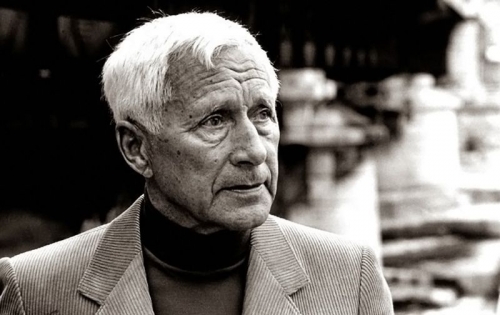
 Il est étrange que la fermeté du tracé psychologique de l’anarque ait pu laisser place au doute, voire à la haine qui jette l’anathème sur toute une œuvre. Il faut chercher ailleurs les raisons de l’incompatibilité de nature organique entre le texte jungerien et son temps – qui ne cesse d’être le nôtre, qui se propage, joue les prolongations. Pour s’y aider, on peut se représenter un décor plus ordinaire que le cadastre imaginaire d’Eumeswil (c’est le grand ordinaire, précisément, qu’il convient de planter) : une soirée de beuverie entre amis et, allant de l’un à l’autre, riant de bon cœur, l’un d’eux, alcoolique abstinent depuis de nombreuses années désormais. Son cas est connu de tous, on aurait pu se dispenser de l’inviter, mais nul ne dispose de la force morale pour en décider. Et c’est – ce fut – un bon ami à nous. Quelle raison de l’exclure ? Son regard bienveillant qui s’attarde sur notre négligé qui finira de sombrer dans l’obscène, l’alcool aidant au fil des heures, rend insupportable sa présence. Mais nul n’a le courage d’en tirer les conséquences. D’ailleurs, quelqu’un l’a-t-il vu depuis tout à l’heure ? L’anarque s’est retiré, personne ne l’a vu faire. Il nous laisse à notre écœurement, à notre haine de nous-mêmes. Salaud !
Il est étrange que la fermeté du tracé psychologique de l’anarque ait pu laisser place au doute, voire à la haine qui jette l’anathème sur toute une œuvre. Il faut chercher ailleurs les raisons de l’incompatibilité de nature organique entre le texte jungerien et son temps – qui ne cesse d’être le nôtre, qui se propage, joue les prolongations. Pour s’y aider, on peut se représenter un décor plus ordinaire que le cadastre imaginaire d’Eumeswil (c’est le grand ordinaire, précisément, qu’il convient de planter) : une soirée de beuverie entre amis et, allant de l’un à l’autre, riant de bon cœur, l’un d’eux, alcoolique abstinent depuis de nombreuses années désormais. Son cas est connu de tous, on aurait pu se dispenser de l’inviter, mais nul ne dispose de la force morale pour en décider. Et c’est – ce fut – un bon ami à nous. Quelle raison de l’exclure ? Son regard bienveillant qui s’attarde sur notre négligé qui finira de sombrer dans l’obscène, l’alcool aidant au fil des heures, rend insupportable sa présence. Mais nul n’a le courage d’en tirer les conséquences. D’ailleurs, quelqu’un l’a-t-il vu depuis tout à l’heure ? L’anarque s’est retiré, personne ne l’a vu faire. Il nous laisse à notre écœurement, à notre haine de nous-mêmes. Salaud !

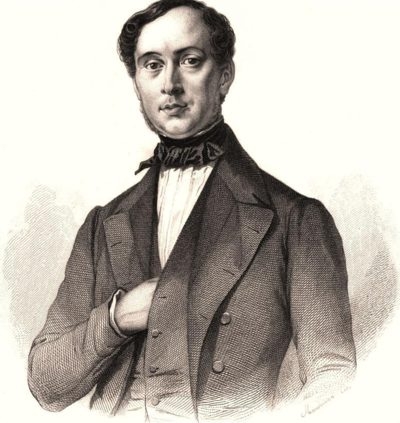
 La deuxième partie de l'ouvrage est consacrée aux textes proprement dits de Carl Schmitt mais il faut attendre la page 157 de l'ouvrage, dans une étude intitulée Catholicisme romain et forme politique datant de 1923, pour que le nom de Cortés apparaisse, d'ailleurs de façon tout à fait anecdotique. Cette étude, plus ample que la première, intitulée Visibilité de l’Église et qui ne nous intéresse que par sa mention d'une paradoxale quoique rigoureuse légalité du Diable (4), mentionne donc le nom de l'essayiste espagnol et, ô surprise, celui d'Ernest Hello (cf. p. 180) mais, plus qu'une approche de Cortés, elle s'intéresse à l'absence de toute forme de représentation symbolique dans le monde technico-économique contemporain, à la différence de ce qui se produisait dans la société occidentale du Moyen Âge. Alors, la représentation, ce que nous pourrions sans trop de mal je crois appeler la visibilité au sens que Schmitt donne à ce mot, conférait «à la personne du représentant une dignité propre, car le représentant d'une valeur élevée ne [pouvait] être dénué de valeur» tandis que, désormais, «on ne peut pas représenter devant des automates ou des machines, aussi peu qu'eux-mêmes ne peuvent représenter ou être représentés» car, si l’État «est devenu Léviathan, c'est qu'il a disparu du monde du représentatif». Carl Schmitt fait ainsi remarquer que «l'absence d'image et de représentation de l'entreprise moderne va chercher ses symboles dans une autre époque, car la machine est sans tradition, et elle est si peu capable d'images que même la République russe des soviets n'a pas trouvé d'autre symbole», pour l'illustration de ce que nous pourrions considérer comme étant ses armoiries, «que la faucille et le marteau» (p. 170). Suit une très belle analyse de la rhétorique de Bossuet, qualifiée de «discours représentatif» qui «ne passe pas son temps à discuter et à raisonner» et qui est plus que de la musique : «elle est une dignité humaine rendue visible par la rationalité du langage qui se forme», ce qui suppose «une hiérarchie, car la résonance spirituelle de la grande rhétorique procède de la foi en la représentation que revendique l'orateur» (p. 172), autrement dit un monde supérieur garant de celui où faire triompher un discours qui s'ente lui-même sur la Parole. Le décisionnisme, vu de cette manière, pourrait n'être qu'un pis-aller, une tentative, sans doute désespérée, de fonder ex abrupto une légitimité en prenant de vitesse l'ennemi qui, lui, n'aura pas su ou voulu tirer les conséquences de la mort de Dieu dans l'hic et nunc d'un monde quadrillé et soumis par la Machine, fruit tavelé d'une Raison devenue folle et tournant à vide. Il y a donc quelque chose de prométhéen dans la décision radicale de celui qui décide d'imposer sa vision du monde, dictateur ou empereur-Dieu régnant sur le désert qu'est la réalité profonde du monde moderne.
La deuxième partie de l'ouvrage est consacrée aux textes proprement dits de Carl Schmitt mais il faut attendre la page 157 de l'ouvrage, dans une étude intitulée Catholicisme romain et forme politique datant de 1923, pour que le nom de Cortés apparaisse, d'ailleurs de façon tout à fait anecdotique. Cette étude, plus ample que la première, intitulée Visibilité de l’Église et qui ne nous intéresse que par sa mention d'une paradoxale quoique rigoureuse légalité du Diable (4), mentionne donc le nom de l'essayiste espagnol et, ô surprise, celui d'Ernest Hello (cf. p. 180) mais, plus qu'une approche de Cortés, elle s'intéresse à l'absence de toute forme de représentation symbolique dans le monde technico-économique contemporain, à la différence de ce qui se produisait dans la société occidentale du Moyen Âge. Alors, la représentation, ce que nous pourrions sans trop de mal je crois appeler la visibilité au sens que Schmitt donne à ce mot, conférait «à la personne du représentant une dignité propre, car le représentant d'une valeur élevée ne [pouvait] être dénué de valeur» tandis que, désormais, «on ne peut pas représenter devant des automates ou des machines, aussi peu qu'eux-mêmes ne peuvent représenter ou être représentés» car, si l’État «est devenu Léviathan, c'est qu'il a disparu du monde du représentatif». Carl Schmitt fait ainsi remarquer que «l'absence d'image et de représentation de l'entreprise moderne va chercher ses symboles dans une autre époque, car la machine est sans tradition, et elle est si peu capable d'images que même la République russe des soviets n'a pas trouvé d'autre symbole», pour l'illustration de ce que nous pourrions considérer comme étant ses armoiries, «que la faucille et le marteau» (p. 170). Suit une très belle analyse de la rhétorique de Bossuet, qualifiée de «discours représentatif» qui «ne passe pas son temps à discuter et à raisonner» et qui est plus que de la musique : «elle est une dignité humaine rendue visible par la rationalité du langage qui se forme», ce qui suppose «une hiérarchie, car la résonance spirituelle de la grande rhétorique procède de la foi en la représentation que revendique l'orateur» (p. 172), autrement dit un monde supérieur garant de celui où faire triompher un discours qui s'ente lui-même sur la Parole. Le décisionnisme, vu de cette manière, pourrait n'être qu'un pis-aller, une tentative, sans doute désespérée, de fonder ex abrupto une légitimité en prenant de vitesse l'ennemi qui, lui, n'aura pas su ou voulu tirer les conséquences de la mort de Dieu dans l'hic et nunc d'un monde quadrillé et soumis par la Machine, fruit tavelé d'une Raison devenue folle et tournant à vide. Il y a donc quelque chose de prométhéen dans la décision radicale de celui qui décide d'imposer sa vision du monde, dictateur ou empereur-Dieu régnant sur le désert qu'est la réalité profonde du monde moderne. Voilà bien ce qui fascine Carl Schmitt lorsqu'il lit la prose de Donoso Cortés, éblouissante de virtuosité comme a pu le remarquer, selon lui et «avec un jugement critique sûr» (p. 217), un Barbey d'Aurevilly : son intransigeance radicale, non pas certes sur les arrangements circonstanciels politiques, car il fut un excellent diplomate, que sur la nécessité, pour le temps qui vient, de prendre les décisions qui s'imposent, aussi dures qu'elles puissent paraître, Carl Schmitt faisant à ce titre remarquer que Donoso Cortés est l'auteur de «la phrase la plus extrême du XIXe siècle : le jour des anéantissements [ou plutôt : des négations] radicaux et des affirmations souveraines arrive», «llega el dia de las negaciones radicales y des las afirmaciones soberanas» (p. 218), une phrase dont chacun des termes est bien évidemment plus que jamais valable à notre époque, mais qui est devenue parfaitement inaudible.
Voilà bien ce qui fascine Carl Schmitt lorsqu'il lit la prose de Donoso Cortés, éblouissante de virtuosité comme a pu le remarquer, selon lui et «avec un jugement critique sûr» (p. 217), un Barbey d'Aurevilly : son intransigeance radicale, non pas certes sur les arrangements circonstanciels politiques, car il fut un excellent diplomate, que sur la nécessité, pour le temps qui vient, de prendre les décisions qui s'imposent, aussi dures qu'elles puissent paraître, Carl Schmitt faisant à ce titre remarquer que Donoso Cortés est l'auteur de «la phrase la plus extrême du XIXe siècle : le jour des anéantissements [ou plutôt : des négations] radicaux et des affirmations souveraines arrive», «llega el dia de las negaciones radicales y des las afirmaciones soberanas» (p. 218), une phrase dont chacun des termes est bien évidemment plus que jamais valable à notre époque, mais qui est devenue parfaitement inaudible.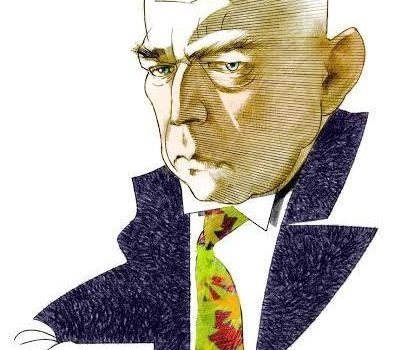
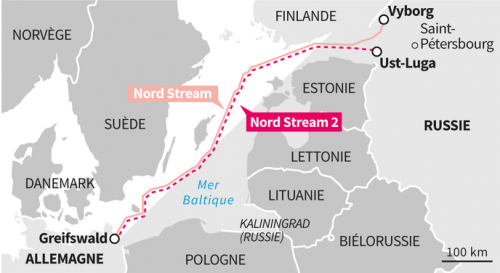




 Sur le Kurfürstendamm, des étudiants iraniens manifestaient contre le Shah. Dans une librairie, je m’étais procuré un exemplaire du fameux livre d’Otto-Ernst Schüddekopf sur le national-bolchevisme de l’époque de la République de Weimar, un témoignage incontournable ; un quart d’heure plus tard, je m’attable à une terrasse pour compulser mes nouveaux bouquins. Je suis assis à une table collective et une dame âgée, souriante, arrive et me dit avec toute la gouaille berlinoise : « Bonjour jeune homme, accepteriez-vous qu’une vieille tarte (« eine alte Klatschtante ») comme moi s’assoie en face de vous ? ». Elle était d’une sombre élégance, coiffée d’un chapeau à la tyrolienne orné d’une superbe plume noire. Nous entamons une conversation et je vois qu’un sourire approbateur se dessine sur son visage jovial quand elle voit le type de littérature historique que je m’étais choisi. Elle a voulu me payer les bouquins. Et elle insistait. Confus, je décline son offre. Elle se lève me salue et laisse 30 marks sur la table. Je veux les lui rendre, elle s’éclipse en me lançant un « Ach, Quatsch ! » chaleureux… A Berlin-Est, je vois circuler de belles automobiles tchèques, à l’esthétique vintage, des Tatra. Sur la Place de la Gendarmerie, en ruine, des arbres avaient poussé sur les marches des deux églises, l’allemande et la huguenote.
Sur le Kurfürstendamm, des étudiants iraniens manifestaient contre le Shah. Dans une librairie, je m’étais procuré un exemplaire du fameux livre d’Otto-Ernst Schüddekopf sur le national-bolchevisme de l’époque de la République de Weimar, un témoignage incontournable ; un quart d’heure plus tard, je m’attable à une terrasse pour compulser mes nouveaux bouquins. Je suis assis à une table collective et une dame âgée, souriante, arrive et me dit avec toute la gouaille berlinoise : « Bonjour jeune homme, accepteriez-vous qu’une vieille tarte (« eine alte Klatschtante ») comme moi s’assoie en face de vous ? ». Elle était d’une sombre élégance, coiffée d’un chapeau à la tyrolienne orné d’une superbe plume noire. Nous entamons une conversation et je vois qu’un sourire approbateur se dessine sur son visage jovial quand elle voit le type de littérature historique que je m’étais choisi. Elle a voulu me payer les bouquins. Et elle insistait. Confus, je décline son offre. Elle se lève me salue et laisse 30 marks sur la table. Je veux les lui rendre, elle s’éclipse en me lançant un « Ach, Quatsch ! » chaleureux… A Berlin-Est, je vois circuler de belles automobiles tchèques, à l’esthétique vintage, des Tatra. Sur la Place de la Gendarmerie, en ruine, des arbres avaient poussé sur les marches des deux églises, l’allemande et la huguenote.


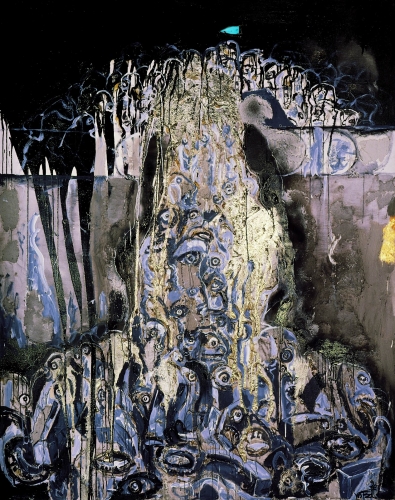



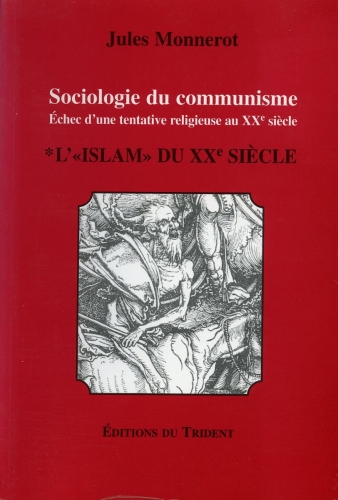






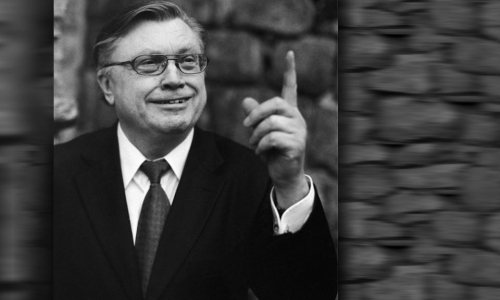




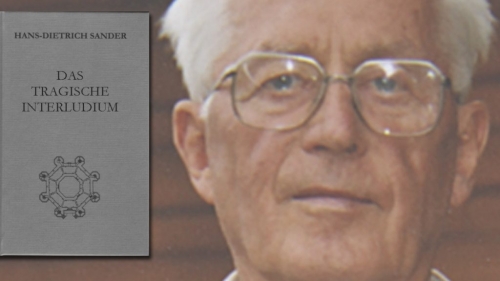
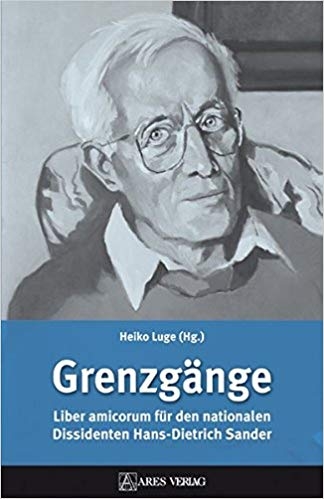 1969 promovierte Sander bei Hans-Joachim Schoeps in Erlangen zum Dr. phil. Der Titel seiner Promotionsschrift lautete „Marxistische Ideologie und allgemeine Kunsttheorie“; Sander setzte sich hier insbesondere mit der Kunstkonzeption von Marx und Engels auseinander. Es war wohl insbesondere der Einfluß des Staatsrechtlers Carl Schmitt, mit dem er bis 1981 brieflich in Kontakt stand, der ihn in dieser Zeit mehr und mehr zu rechtskonservativen Auffassungen tendieren ließ. Von 1964–1974 arbeitete er für das Deutschland-Archiv. In dieser Zeit gestaltete er gelegentlich auch Rundfunkfeuilletons für öffentlich-rechtliche Sender. Sanders „Geschichte der Schönen Literatur in der DDR“ (1972) löste eine heftige Kampagne aus, in deren Folge der Verlag das Buch aus dem Vertrieb zog. Sander verlor nun zunehmend an publizistischem Spielraum. Alternativen fand er unter anderem bei Caspar von Schrenck-Notzings Zeitschrift Criticón.
1969 promovierte Sander bei Hans-Joachim Schoeps in Erlangen zum Dr. phil. Der Titel seiner Promotionsschrift lautete „Marxistische Ideologie und allgemeine Kunsttheorie“; Sander setzte sich hier insbesondere mit der Kunstkonzeption von Marx und Engels auseinander. Es war wohl insbesondere der Einfluß des Staatsrechtlers Carl Schmitt, mit dem er bis 1981 brieflich in Kontakt stand, der ihn in dieser Zeit mehr und mehr zu rechtskonservativen Auffassungen tendieren ließ. Von 1964–1974 arbeitete er für das Deutschland-Archiv. In dieser Zeit gestaltete er gelegentlich auch Rundfunkfeuilletons für öffentlich-rechtliche Sender. Sanders „Geschichte der Schönen Literatur in der DDR“ (1972) löste eine heftige Kampagne aus, in deren Folge der Verlag das Buch aus dem Vertrieb zog. Sander verlor nun zunehmend an publizistischem Spielraum. Alternativen fand er unter anderem bei Caspar von Schrenck-Notzings Zeitschrift Criticón.  Sander hat nie einen Hehl daraus gemacht, daß er die Bundesrepublik für nicht reformierbar hielt. Beide deutsche Staaten seien unter Kuratel der Besatzer entstanden, was unter anderem für eine Negativauslese im Hinblick auf die Eliten gesorgt habe. Dennoch sei nichts verloren: Die Deutschen bräuchten „sich nur innerlich aufzuraffen“, so Sander im „Nationalen Imperativ“, „um sich der brüchigen alten Zustände der Innen- und Außenpolitik zu entledigen, wieder auf die überlieferten, immer noch wirkenden Tugenden zu setzen und neue Formen und Ziele zu wagen, die in Richtung auf einen neuen Machtstaat, eine neue Großmacht drängen, die den Nachbarn durchaus zuzumuten wäre, weil durch nichts sonst das schutzbedürftige Europa noch gerettet werden kann.“ Diese Sätze können, in einer Zeit, in der Europa durch die Auswirkungen der „Flüchtlingskrise“ schutzbedürftiger denn je ist, durchaus als Vermächtnis Sanders nicht nur an die Deutschen gelesen werden.
Sander hat nie einen Hehl daraus gemacht, daß er die Bundesrepublik für nicht reformierbar hielt. Beide deutsche Staaten seien unter Kuratel der Besatzer entstanden, was unter anderem für eine Negativauslese im Hinblick auf die Eliten gesorgt habe. Dennoch sei nichts verloren: Die Deutschen bräuchten „sich nur innerlich aufzuraffen“, so Sander im „Nationalen Imperativ“, „um sich der brüchigen alten Zustände der Innen- und Außenpolitik zu entledigen, wieder auf die überlieferten, immer noch wirkenden Tugenden zu setzen und neue Formen und Ziele zu wagen, die in Richtung auf einen neuen Machtstaat, eine neue Großmacht drängen, die den Nachbarn durchaus zuzumuten wäre, weil durch nichts sonst das schutzbedürftige Europa noch gerettet werden kann.“ Diese Sätze können, in einer Zeit, in der Europa durch die Auswirkungen der „Flüchtlingskrise“ schutzbedürftiger denn je ist, durchaus als Vermächtnis Sanders nicht nur an die Deutschen gelesen werden. 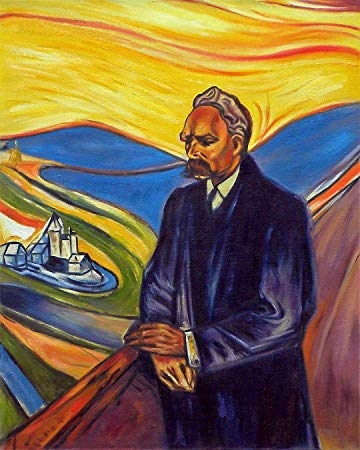
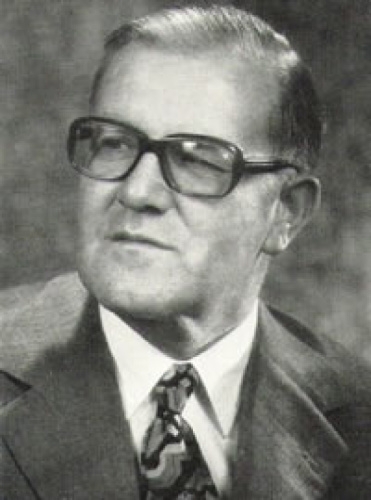 According to Swiss-German historian Armin Mohler, who introduced this formula in a prolific albeit debatable study “Conservative Revolution in Germany: 1918–1932” [80] to describe an intellectual milieu hostile to the “ideas of 1789,” CR, as a cultural and political current, has taken shape in the interwar Germany, but its conceptual relevance transcends these temporal and geographic boundaries. Although later metaphysical discussions of Nietzscheanism
According to Swiss-German historian Armin Mohler, who introduced this formula in a prolific albeit debatable study “Conservative Revolution in Germany: 1918–1932” [80] to describe an intellectual milieu hostile to the “ideas of 1789,” CR, as a cultural and political current, has taken shape in the interwar Germany, but its conceptual relevance transcends these temporal and geographic boundaries. Although later metaphysical discussions of Nietzscheanism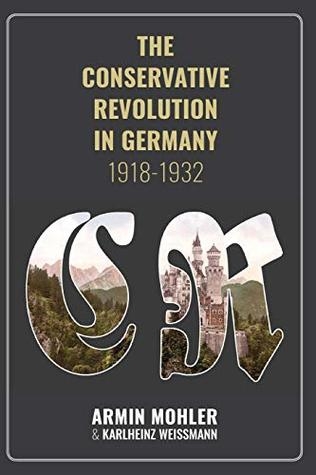 More precisely, this interwar German movement, which has always been escaping strict definitions, owes its reputation of the “ideocratic,” “metapolitical,” “neither right-wing, nor left-wing” Third Way precisely to embracing Nietzscheanism as a means of Weberian “re-enchantment of the world” [63]. Indeed, in social sciences and humanities, it was no sooner than Nietzsche put forward the event of the “death of god” that ideological and, basically, purely modern perplexities of the Left and Right have become a low priority compared to transhistorical (epochal) interplay of modernism and antimodernism, broader, the progressive and regressive vector. The latter were partially grasped by derivative intuitions of reactionary modernism [38], organological supermodern [63, 109; 40], archeofuturism [10], etc. in reference to Nietzsche-inspired phenomenon of CR.
More precisely, this interwar German movement, which has always been escaping strict definitions, owes its reputation of the “ideocratic,” “metapolitical,” “neither right-wing, nor left-wing” Third Way precisely to embracing Nietzscheanism as a means of Weberian “re-enchantment of the world” [63]. Indeed, in social sciences and humanities, it was no sooner than Nietzsche put forward the event of the “death of god” that ideological and, basically, purely modern perplexities of the Left and Right have become a low priority compared to transhistorical (epochal) interplay of modernism and antimodernism, broader, the progressive and regressive vector. The latter were partially grasped by derivative intuitions of reactionary modernism [38], organological supermodern [63, 109; 40], archeofuturism [10], etc. in reference to Nietzsche-inspired phenomenon of CR.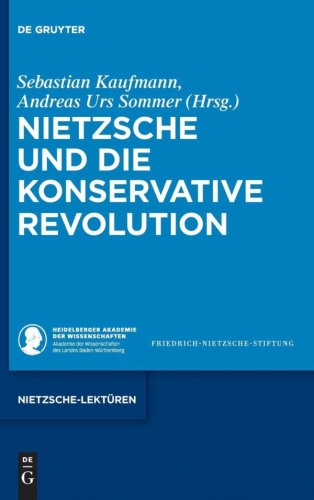
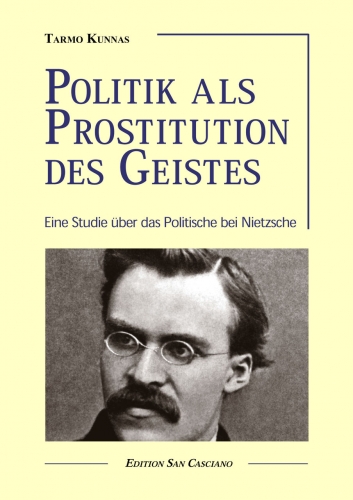 Indeed, so far, attempts to convert Nietzsche into politics have been mostly associated with the Nietzsche-Archiv’s destiny in the service of National Socialist ideology thanks to its ardent supporter Elisabeth Förster-Nietzsche, philosopher’s sister. However, the same destiny largely befell the work of conservative-revolutionary Nietzscheans, the brightest example being “The Third Empire”
Indeed, so far, attempts to convert Nietzsche into politics have been mostly associated with the Nietzsche-Archiv’s destiny in the service of National Socialist ideology thanks to its ardent supporter Elisabeth Förster-Nietzsche, philosopher’s sister. However, the same destiny largely befell the work of conservative-revolutionary Nietzscheans, the brightest example being “The Third Empire”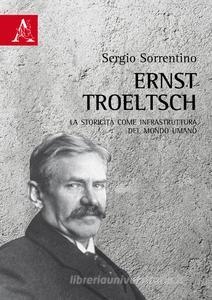 On the other hand, according to Ernst Troeltsch, German philosopher of history, theologian and, along with Thomas Mann and Hugo von Hofmannsthal, one of the first promoters of the term “CR” [107, 454], only after the First World War, through “war experience,” Nietzsche’s thought was purified of its “sickly and exaggerated elements and thus had set ‘new aims’” [106, 75, quoted after 64, 48] for the German people. Jürgen Habermas confirms that Nietzsche reached the peak of popularity in Germany’s interwar period, when “the ideas of 1914” were confronted with “the ideas of 1789,” noting that “thinkers as various as Oswald Spengler, Carl Schmitt, Gottfried Benn, Ernst Jünger, Martin Heidegger, and even Arnold Gehlen show affinity with this background” [18, 209].
On the other hand, according to Ernst Troeltsch, German philosopher of history, theologian and, along with Thomas Mann and Hugo von Hofmannsthal, one of the first promoters of the term “CR” [107, 454], only after the First World War, through “war experience,” Nietzsche’s thought was purified of its “sickly and exaggerated elements and thus had set ‘new aims’” [106, 75, quoted after 64, 48] for the German people. Jürgen Habermas confirms that Nietzsche reached the peak of popularity in Germany’s interwar period, when “the ideas of 1914” were confronted with “the ideas of 1789,” noting that “thinkers as various as Oswald Spengler, Carl Schmitt, Gottfried Benn, Ernst Jünger, Martin Heidegger, and even Arnold Gehlen show affinity with this background” [18, 209].  Key works by Locchi for our study, “The Meaning of History” (1971), “Wagner, Nietzsche and the Myth of Suprahumanism” (1982), “Martin Heidegger and Conservative Revolution” (1988), also published in response to “Heidegger’s case,” etc., reveal a threefold structure of history “unlocked” by initiators of the discontinuity with the tradition of preceding two thousand years [13, 211] and founders of the suprahumanist myth: Richard Wagner, above all, as an author of “The Ring of the Nibelung” and Friedrich Nietzsche reconciled with him and portrayed as his disciple. Having paralleled Wagner’s “aristocratic socialism” with CR, Locchi criticizes not only Lukács but also Adorno’s take on Wagner along with the entire Frankfurt School. According to him, suprahumanism, inspired by Johann Fichte’s discovery of Germania
Key works by Locchi for our study, “The Meaning of History” (1971), “Wagner, Nietzsche and the Myth of Suprahumanism” (1982), “Martin Heidegger and Conservative Revolution” (1988), also published in response to “Heidegger’s case,” etc., reveal a threefold structure of history “unlocked” by initiators of the discontinuity with the tradition of preceding two thousand years [13, 211] and founders of the suprahumanist myth: Richard Wagner, above all, as an author of “The Ring of the Nibelung” and Friedrich Nietzsche reconciled with him and portrayed as his disciple. Having paralleled Wagner’s “aristocratic socialism” with CR, Locchi criticizes not only Lukács but also Adorno’s take on Wagner along with the entire Frankfurt School. According to him, suprahumanism, inspired by Johann Fichte’s discovery of Germania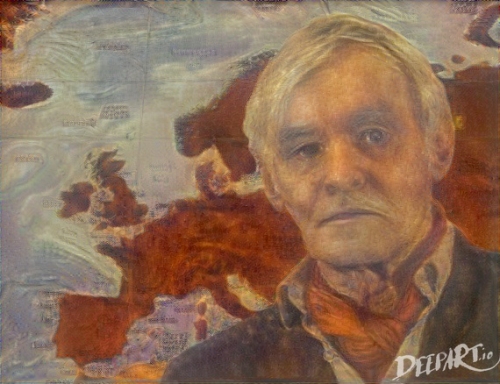
 It is Heidegger’s disciple Karl Löwith (“Nietzsche’s Philosophy of the Eternal Recurrence” and “From Hegel to Nietzsche: The Revolution in 19th Century Thought”)
It is Heidegger’s disciple Karl Löwith (“Nietzsche’s Philosophy of the Eternal Recurrence” and “From Hegel to Nietzsche: The Revolution in 19th Century Thought”)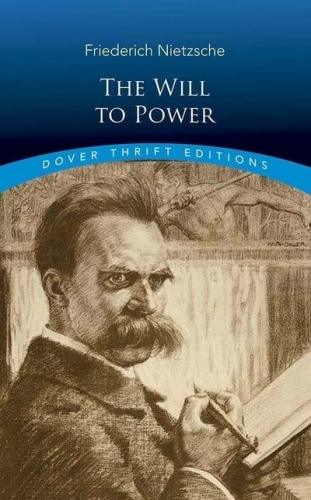 Yet Old Gunpowder-Head, as Jünger used to call Nietzsche [51], provided conservative-revolutionary luminaries like him not only with recipes for social change. For historians of philosophy, connections between Nietzsche’s legacy and CR (which is the subject matter of the study) are of a special interest given that the famous “turn” of Heidegger towards a conservative criticism of technology and final abandonment of transcendentalism and voluntarism was triggered namely by his familiarization with Jünger’s conservative-revolutionary classic: “Total Mobilization” (1930) and “The Worker. Domination and Gestalt” (1932) [11, 718].
Yet Old Gunpowder-Head, as Jünger used to call Nietzsche [51], provided conservative-revolutionary luminaries like him not only with recipes for social change. For historians of philosophy, connections between Nietzsche’s legacy and CR (which is the subject matter of the study) are of a special interest given that the famous “turn” of Heidegger towards a conservative criticism of technology and final abandonment of transcendentalism and voluntarism was triggered namely by his familiarization with Jünger’s conservative-revolutionary classic: “Total Mobilization” (1930) and “The Worker. Domination and Gestalt” (1932) [11, 718]. 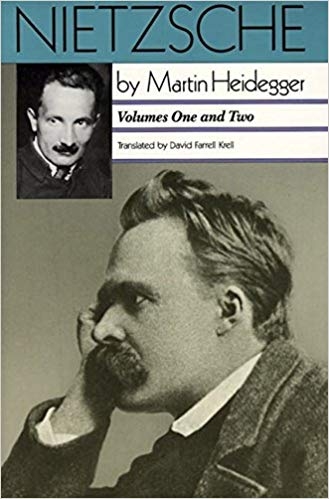 Nietzsche as the philosopher who, in Habermas’ words, “entrusted the overcoming of nihilism to the aesthetically revived Dionysian myth” [19, 99] was explored in-depth by Friedrich Georg Jünger. In his eponymous book “Nietzsche” (1949) [60], as well as famous trilogy “Greek myths” (1947) comprised of “The Greek Gods,” “The Titans” and “The Heroes” [59], he paid a special attention to Pan as an epitome of the wild and Dionysus as a redeemer from the misery of time. Both motifs, as well as F. G. Jünger’s book “The Perfection of Technology” (written in 1939 and translated to English as “The Failure of Technology: Perfection Without Purpose” [61]), intersect with the late Heidegger’s criticism of instrumental rationality as “machination,” yet this time he considered Nietzsche’s philosophy the endpoint of Western metaphysics rather than the salvation [see 112].
Nietzsche as the philosopher who, in Habermas’ words, “entrusted the overcoming of nihilism to the aesthetically revived Dionysian myth” [19, 99] was explored in-depth by Friedrich Georg Jünger. In his eponymous book “Nietzsche” (1949) [60], as well as famous trilogy “Greek myths” (1947) comprised of “The Greek Gods,” “The Titans” and “The Heroes” [59], he paid a special attention to Pan as an epitome of the wild and Dionysus as a redeemer from the misery of time. Both motifs, as well as F. G. Jünger’s book “The Perfection of Technology” (written in 1939 and translated to English as “The Failure of Technology: Perfection Without Purpose” [61]), intersect with the late Heidegger’s criticism of instrumental rationality as “machination,” yet this time he considered Nietzsche’s philosophy the endpoint of Western metaphysics rather than the salvation [see 112].  Finally, in the most frequently quoted excerpt from “The Adventurous Heart,” as if Nietzschean prophecy of the “twilight of the idols” has come true, Jünger comments on a sinister reputation gained at that time by his generation. To wit, they were said to have been capable of destroying the temples. Far from denying it, Jünger, in fact, objected that such a sentence simply bore no significance in the futile epoch producing nothing but museums [53, 112].
Finally, in the most frequently quoted excerpt from “The Adventurous Heart,” as if Nietzschean prophecy of the “twilight of the idols” has come true, Jünger comments on a sinister reputation gained at that time by his generation. To wit, they were said to have been capable of destroying the temples. Far from denying it, Jünger, in fact, objected that such a sentence simply bore no significance in the futile epoch producing nothing but museums [53, 112]. 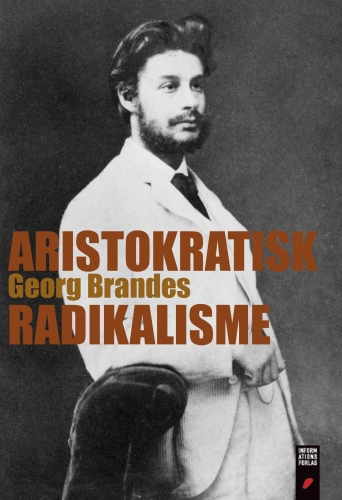 Nietzscheanism as “radical aristocratism,” the formula first suggested by Georges Brandes and personally approved by Nietzsche [83, 213], burst into blossom in “Nietzsche: Attempt at a Mythology” (1918), the most popular book on Nietzsche in Weimar Germany by the Circle’s and Mann’s associate Ernst Bertram, as well as catalyzed Mann’s ideal of the “nobility of the spirit” [72]. Deep connections between Nietzsche, George and Austrian prodigy Hugo von Hofmannsthal who, like Mann, popularized the term “CR” in the field of cultural criticism in his 1927 address to students of the University of Munich “Literature as the Spiritual Space of the Nation,” are also widely known [44; 103]. According to Hofmannsthal, the Age of Enlightenment is nothing but a moment within the unfolding countermovement of CR of a scope unknown to Europe [44, 412–413].
Nietzscheanism as “radical aristocratism,” the formula first suggested by Georges Brandes and personally approved by Nietzsche [83, 213], burst into blossom in “Nietzsche: Attempt at a Mythology” (1918), the most popular book on Nietzsche in Weimar Germany by the Circle’s and Mann’s associate Ernst Bertram, as well as catalyzed Mann’s ideal of the “nobility of the spirit” [72]. Deep connections between Nietzsche, George and Austrian prodigy Hugo von Hofmannsthal who, like Mann, popularized the term “CR” in the field of cultural criticism in his 1927 address to students of the University of Munich “Literature as the Spiritual Space of the Nation,” are also widely known [44; 103]. According to Hofmannsthal, the Age of Enlightenment is nothing but a moment within the unfolding countermovement of CR of a scope unknown to Europe [44, 412–413].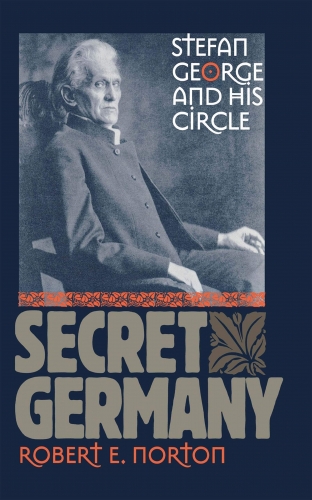 Apart from Hölderlin, Goethe and Nietzsche, George’s vision of the Secret Germany also strongly influenced Hielscher, a friend of Martin Buber and an editor of National-Revolutionary magazines “Der Vormarsch” and “Das Reich” who created a unique panentheistic theology and closely cooperated with Jünger [42, 216–225]. However, it was Jünger who revolutionized detached ideals of Young Conservatives by reinterpreting the Dionysian principle in Nietzsche’s philosophy of culture as the titanic principle of technology that defines the modernity. Returning Heidegger’s reproach that Jünger, employing visual metaphors of the metaphysical transition, was not a “thinker” [36, 263], Jünger claimed that Heidegger lacked a clear political vision and that is why he hoped that National Socialism would bring something new [39, 55]. At the same time, Jünger’s own “clear” vision performed a critical function, for, except for a short period of political involvement as a publicist, he remained “a seismograph of the epoch” [92, 525]. Yet, in contrast with “cultural pessimist” Heidegger who eventually concluded that “only a God could save us” [32], Jünger, in spite of an apparent impact of Heidegger’s and F.G. Jünger’s presumed “technophobia,” was unique in making the transvaluation of all values the programmatic quest of his entire body of work.
Apart from Hölderlin, Goethe and Nietzsche, George’s vision of the Secret Germany also strongly influenced Hielscher, a friend of Martin Buber and an editor of National-Revolutionary magazines “Der Vormarsch” and “Das Reich” who created a unique panentheistic theology and closely cooperated with Jünger [42, 216–225]. However, it was Jünger who revolutionized detached ideals of Young Conservatives by reinterpreting the Dionysian principle in Nietzsche’s philosophy of culture as the titanic principle of technology that defines the modernity. Returning Heidegger’s reproach that Jünger, employing visual metaphors of the metaphysical transition, was not a “thinker” [36, 263], Jünger claimed that Heidegger lacked a clear political vision and that is why he hoped that National Socialism would bring something new [39, 55]. At the same time, Jünger’s own “clear” vision performed a critical function, for, except for a short period of political involvement as a publicist, he remained “a seismograph of the epoch” [92, 525]. Yet, in contrast with “cultural pessimist” Heidegger who eventually concluded that “only a God could save us” [32], Jünger, in spite of an apparent impact of Heidegger’s and F.G. Jünger’s presumed “technophobia,” was unique in making the transvaluation of all values the programmatic quest of his entire body of work.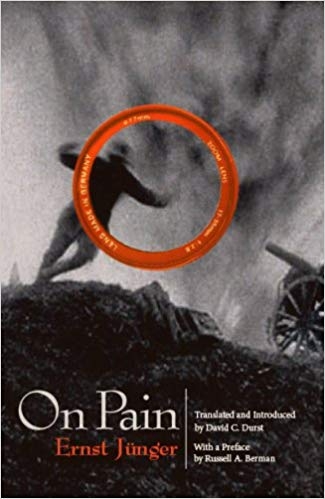 That is how the early Jünger’s active nihilism counterbalanced the Young-Conservative fascination with the religious “Russian idea” and Dostoevsky’s “revolution out of conservatism” [109, 355]. Stating the ongoing “geological revolution” [114: 55–58], Jünger refers to the Joachist Age of the Holy Spirit [52, 414] only in “At the Wall of Time” (1959) when, remembering Nietzsche’s formula of the Superman as the conqueror of god and nothing, the pursued self-overcoming of nihilism enters the “creative” phase of challenging the nothing itself. Already in 1934 essay “On Pain” Jünger gives the following assessment of its proceedings: “We conclude, then, that we find ourselves in a last and indeed quite remarkable phase of nihilism, characterized by the broad expansion of new social orders with corresponding values yet to be seen” [55, 46]. In Klemperer’s words, “tough Nietzscheans” Spengler, Jünger and Moeller van den Bruck, in fact, “signed a pact with the devil” when took a risk to follow in Nietzsche’s footsteps and attempted to turn nihilism against itself [64, 153].
That is how the early Jünger’s active nihilism counterbalanced the Young-Conservative fascination with the religious “Russian idea” and Dostoevsky’s “revolution out of conservatism” [109, 355]. Stating the ongoing “geological revolution” [114: 55–58], Jünger refers to the Joachist Age of the Holy Spirit [52, 414] only in “At the Wall of Time” (1959) when, remembering Nietzsche’s formula of the Superman as the conqueror of god and nothing, the pursued self-overcoming of nihilism enters the “creative” phase of challenging the nothing itself. Already in 1934 essay “On Pain” Jünger gives the following assessment of its proceedings: “We conclude, then, that we find ourselves in a last and indeed quite remarkable phase of nihilism, characterized by the broad expansion of new social orders with corresponding values yet to be seen” [55, 46]. In Klemperer’s words, “tough Nietzscheans” Spengler, Jünger and Moeller van den Bruck, in fact, “signed a pact with the devil” when took a risk to follow in Nietzsche’s footsteps and attempted to turn nihilism against itself [64, 153]. 















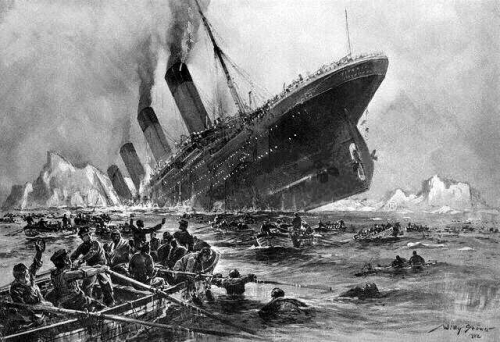
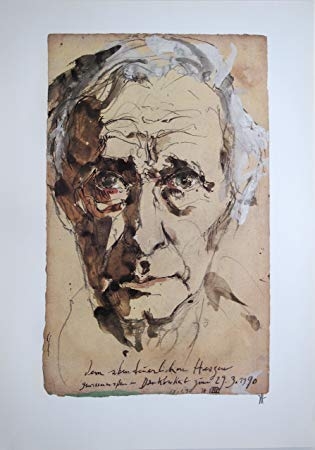 « Il est de fait que les progrès de l’automatisme et ceux de la peur sont très étroitement liés, en ce que l’homme, pour prix d’allégements techniques, limite sa capacité de décision. Il y gagne toute sorte de commodités. Mais, en contrepartie, la perte de sa liberté ne peut que s’aggraver. La personne n’est plus dans la société comme un arbre dans la forêt ; elle ressemble au passager d’un navire rapide, qui porte le nom de Titanic, ou encore de Léviathan. Tant que le ciel demeure serein et le coup d’œil agréable, il ne remarque guère l’état de moindre liberté dans lequel il est tombé. Au contraire : l’optimisme éclate, la conscience d’une toute-puissance que procure la vitesse. Tout change lorsqu’on signale des îles qui crachent des flammes, ou des icebergs. Alors, ce n’est pas seulement la technique qui passe du confort à d’autres domaines : le manque de liberté se fait sentir, soit que triomphent les pouvoirs élémentaires, soit que des solitaires, ayant gardé leur force, exercent une autorité absolue. »
« Il est de fait que les progrès de l’automatisme et ceux de la peur sont très étroitement liés, en ce que l’homme, pour prix d’allégements techniques, limite sa capacité de décision. Il y gagne toute sorte de commodités. Mais, en contrepartie, la perte de sa liberté ne peut que s’aggraver. La personne n’est plus dans la société comme un arbre dans la forêt ; elle ressemble au passager d’un navire rapide, qui porte le nom de Titanic, ou encore de Léviathan. Tant que le ciel demeure serein et le coup d’œil agréable, il ne remarque guère l’état de moindre liberté dans lequel il est tombé. Au contraire : l’optimisme éclate, la conscience d’une toute-puissance que procure la vitesse. Tout change lorsqu’on signale des îles qui crachent des flammes, ou des icebergs. Alors, ce n’est pas seulement la technique qui passe du confort à d’autres domaines : le manque de liberté se fait sentir, soit que triomphent les pouvoirs élémentaires, soit que des solitaires, ayant gardé leur force, exercent une autorité absolue. »